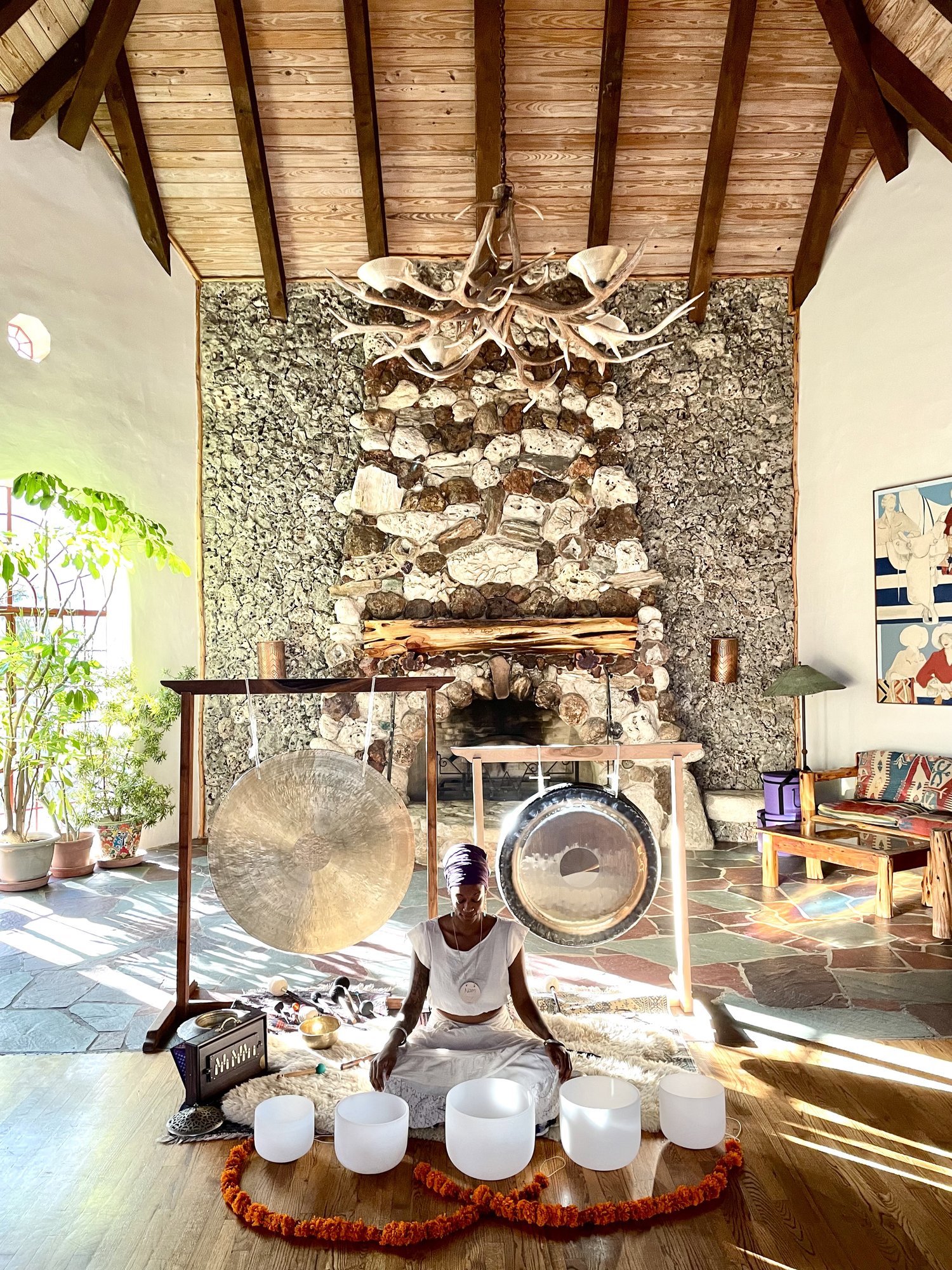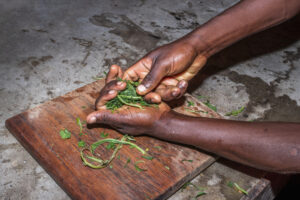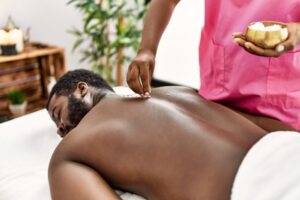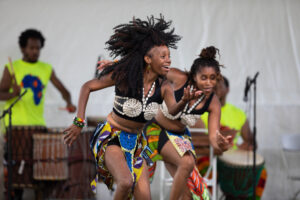Healing Practices and Traditions from across the African Diaspora
Written by Danielle Fletcher
As a Westernized culture, Americans tend to see the body and mind as two separate entities. If harm befalls the body, the body receives treatment. If harm befalls the mind, the mind gets treated as its own entity. Trauma’s effects on the brain and body have been widely researched in recent years and have confirmed what many ancient and indigenous cultures have known. The mind and body are intertwined in the human experience, and so their healing must be as well. It’s why at SAFE, we provide and encourage a holistic model to empower survivors in their journey of healing both their body and mind.
African cultures have long believed this and have contributed a wealth of medicinal knowledge and a vast array of healing practices and remedies. These traditions have passed from one generation to another and are still shared as healing solutions across cultures today. Everyone can benefit from any of these practices, and many of us have likely taken part in them without ever knowing their origins or fully understanding their healing properties.
Rituals, Ancestral Communion, and Spiritual Healing
 As mentioned, many African cultures believe in holistic healing of body and mind and so traditional rituals follow suit in creating a spiritual and emotional balance with the physical. Some rituals are reserved for healing an illness, others for speaking with ancestors, and some to commune with nature. Many healing ceremonies involve some combination of appeals from healers or Sangomas to ancestors. Healers sometimes utilize bones, shells, or stones to communicate with ancestors and spiritual entities. Today, rituals can also look like healthy habits that involve setting an intention for well-being and positive outcomes. Think meditation, breathwork, or a sentiment shared that sets the intention of an event.
As mentioned, many African cultures believe in holistic healing of body and mind and so traditional rituals follow suit in creating a spiritual and emotional balance with the physical. Some rituals are reserved for healing an illness, others for speaking with ancestors, and some to commune with nature. Many healing ceremonies involve some combination of appeals from healers or Sangomas to ancestors. Healers sometimes utilize bones, shells, or stones to communicate with ancestors and spiritual entities. Today, rituals can also look like healthy habits that involve setting an intention for well-being and positive outcomes. Think meditation, breathwork, or a sentiment shared that sets the intention of an event.
– Holistic Mental Health – HolisticMH.com: Nakia Gray Scott, MD, believes that a holistic approach to wellness reveals an individual’s true potential.
– Blue Cypress School of Holism – BlueCypressSchool.org: A magical and educational center located in Wimberley, Texas. Through the layering of modalities, we practice going within to better understand ourselves and the world around us. We are “walking close to the Earth in the Texas Hill Country” in order to establish a deep sense of purpose and wholeness.
– Chak Therapy – chaktherapy.com: Spiritually holistic self-care brand
Indigenous Plant Knowledge and Herbal Remedies 
African cultures possess a deep knowledge of their local plant life and their unique healing properties. Traditional healers are especially steeped in the knowledge of medicinal values of local plant life which they use for treating common illnesses, complex diseases and for upkeep on overall well-being.
– RieFraisH – www.riefraish.com: RieFraisH, LLC is a multi-faceted spiritual wholeness brand. They make and sell body butter, jewelry, lip balm, homemade yogurt and bohemian chic clothing.
Massage and Body Work 
For centuries, African cultures have embraced massage and bodywork as effectively therapeutic healing methods. From sacred Ethiopian coffee ceremonies to the luxurious Moroccan hammams and the soothing Ghanaian shea butter massages, these traditional techniques offer not just relaxation but also holistic advantages for both the body and the mind. By improving blood circulation, alleviating muscle tension, and reinvigorating energy pathways, these practices enhance overall well-being.
– Reformation Massage & Bodywork – Reformationmassageandbodywork.com: Advanced Therapeutic Massage & Bodywork
– Anointed Hands Heavenly Touch Massage & BodyWorks – Ahhtmassage.com: Lymphatic drainage, massage, post op care and body contouring service and training
Music, Dance, and Drumming
 Music, dance, and drumming hold profound significance within healing rituals and ceremonies, across the African diaspora. The rhythmic cadences and expressive movements are thought to evoke trance-like states, altering consciousness to create a deep connection with one’s inner being. Through these practices, individuals can release emotional barriers and access mental and emotional healing, improving overall physical well-being. Perhaps most importantly, this therapeutic approach fosters a communal bond, generating a shared sense of healing energy within the group.
Music, dance, and drumming hold profound significance within healing rituals and ceremonies, across the African diaspora. The rhythmic cadences and expressive movements are thought to evoke trance-like states, altering consciousness to create a deep connection with one’s inner being. Through these practices, individuals can release emotional barriers and access mental and emotional healing, improving overall physical well-being. Perhaps most importantly, this therapeutic approach fosters a communal bond, generating a shared sense of healing energy within the group.
– Jaukeem Balcom (a SAFE staff member) teaches a class called “So You Think You Can’t Dance” on Tuesdays at 6:45PM at Crunch Round Rock Gym. You don’t need to be a member. to participate. Jay has 10+ years of dance experience.
“Dance has been a part of our culture forever and has always been a way to tell stories, heal, and just have fun! In the words of Big Freedia ‘Release your wiggle’. That’s always what I want people to do! Feel that same joy and healing of letting go and just dancing. You don’t have to dance like me to dance and feel the same joy, but there is a vulnerability with that I want everyone to explore,” Jay says.
Food and Fellowship
 In traditional African healing practices, food and fellowship hold significant roles including nourishment, solidarity, and cultural continuity. Specific foods with medicinal properties are incorporated into rituals, offering both physical nourishment and symbolic support for healing. Sharing meals fosters a sense of community and mutual care, strengthening social bonds and promoting emotional well-being. Overall, food and fellowship play multifaceted roles in traditional African healing practices that continue today, offering physical nourishment, emotional support, social cohesion, and cultural continuity to individuals and communities alike.
In traditional African healing practices, food and fellowship hold significant roles including nourishment, solidarity, and cultural continuity. Specific foods with medicinal properties are incorporated into rituals, offering both physical nourishment and symbolic support for healing. Sharing meals fosters a sense of community and mutual care, strengthening social bonds and promoting emotional well-being. Overall, food and fellowship play multifaceted roles in traditional African healing practices that continue today, offering physical nourishment, emotional support, social cohesion, and cultural continuity to individuals and communities alike.
– Earnest Holistic Health – DrBlessingA.com: Dr. Blessing Anyatonwu D.C., M.S. is the founder of Earnest Holistic Health, a nutritional consulting practice that focuses on nutrition and digestive health.
–
Holistic healing practices rooted in traditional African cultures aren’t just part of history. They continue to profoundly influence lives today. These practices, emphasizing the interconnectedness of the mind, body, and spirit, have endured and evolved, shaping the way individuals approach wellness and healing. From rituals that foster spiritual and emotional balance to the use of indigenous plant knowledge and herbal remedies for physical well-being, to food fellowship and community connections that create cultural continuity, these traditions continue to enrich the lives of people across generations and geographical boundaries.